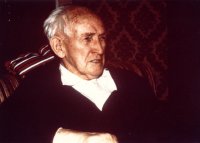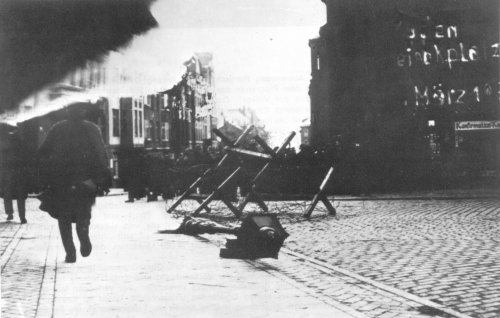Homepage Renate and Klaus Kuhl - Kapp-Putsch in Kiel
Kapp-Putsch in Kiel, March 1920

Excerpts from an interview with Otto Preßler 1979:
You could tell it from some external things. Where workers met, be it from the KPD [Communist Party of Germany] or the USPD [Independend Socialdemocratic Party of Germany], there were always some groups of troublemakers, which consisted of Navy personel or other units, which were stationed in in Kiel. From there you could sense, something was going on. And when we conducted public meetings in the "Colosseum", this was then a large pub and dancing place at the Exerzierplatz or in the "Deutsche Wacht" etc., then these hooligans turned up. They were indeed soldiers in mufti, ordered by their commanding officers to disturb the meetings of the KPD, USPD and other parties. We experienced that more than once, and then we knew from where the wind started blowing.
...
When going to work in the morning, we heard already something
from the telegraph offices, in Berlin something was happening.
And then being at our place of work things were becoming a bit
more specific...
K: You were still working at "Stocks und Kolbe"?
Preßler: No, at the ship yard "Germania". At "Stocks
und Kolbe" I worked only in 1919. But 1920, when the Kapp
Putsch took place, I was at the ship yard "Germania".
And now it was said, Kapp has taken power. Immediately afterwards
news from the telegraph offices came that the unions announced
the general strike. The imperial government had flown, one would
say, from Berlin to Weimar (K. Kuhl: It was Dresden actually).
They established themselves there, and then resistance was organized
from there - especially the resistance out of the firms in the
large cities Berlin, Magdeburg, Kiel etc. So we could say, within
the course of that day was the general strike, concerning the
news we got more or less complete.
K.: You dropped tools also at the ship-yard "Germania"?
Preßler: Immediately. And we moved in a large demonstration from
the ship yards to big meetings in the "Deutsche Wacht" (earlier
named "Englischer Garten"). And then the directives from the parties
and from the unions were issued, "general strike" all over Germany.
Thereafter we were on the look-out only, what will happen now.
...
During the first days it was still that way, that these "Noskites"
(annotation Kuhl: Preßler used this term very generally
for the Freicorps of Wilfried von Loewenfeld, as this had been
formed in Kiel with the knowledge and approval of Noske, but he
used it also for the "Zeitfreiwilligen" and the regular
marines.) loitered around in Gaarden (quarter of Kiel). The lay
with machine guns in the streets and when someone of the citizans
showed up they shot through the streets with their MGs. "Shut
the windows!" they yelled and then they fired.
K: So there was a kind of curfew?
Preßler: Yes, they made it on their own. Elisabethstrasse, Vinetaplatz,
Kirchenweg and evrywhere there were shootings. The women opened
the windows, "What is going on?" and then they fired already down
there.
That was such a nervous thing and it calmed down soon, because
our people came to know how to operate against these "brothers".

Photograph: Barrikades in March 1920 Wilhelminenstr./
Fährstr. (nowadays Legienstr.),
view to „Kleiner Kiel“
Wrongly written on the photo: "Dreiecksplatz".
...
We came from above from the Holstenstrasse and moved down the
Küterstrasse, by that time there was still this old mill (annotation
Kuhl: today there is the Landesbank). Under this mill we lay with
a machine gun and shot at these "brothers" who lay in
the garden of the Spar- und Leihkasse. The Noskites, came from
the Bergstrasse and took cover in the bushes in front of the Spar-
und Leihkasse ...
I remember we made that thing starting from the "Kleiner
Kiel" (annotation Kuhl: shallow lake surrounding part of
the old city) against the Noskites, who took stand in that school
in the Bergstrasse.
Right across was by that time the so called Kasu-Haus, and also
they shot from the other side of the Muhliusstrasse from Brunswik
(annotation Kuhl: another town quarter) with mine throwers. And
then they fired always over into the Bergstrasse with mine throwers,
and then things started there.
...
K.: In all town quarters, in all firms there were such action-committees,
which formed troops and organized armament.
Preßler: Forming troops, that went actually very compact
in the context with the fights in Kiel. Then the worker's "Wehr"
was established, then the help of the authorities was called for,
also in reference to the funding, of the then in the worker's
"Wehr" serving colleagues. They got their uniforms,
their arms, their pay etc and they did their service then as members
of the Kieler worker's "Wehr".
K.: It was organized that thoroughly?
Preßler: Yes, in the different town quarters. In Gaarden
in the Kaiserstrasse and in the Wik and above in the north. That
was well organized afterwards ...
K.:... from these action-committees which consisted in most cases
of representatives of all three parties (annotation Kuhl: i.e.
SPD, USPD and KPD).
Preßler: Yes.
...
The proletarians said, "So, now we clean up!" Now the
big shots will be held responsible their bakeries and houses will
be screened and ransacked. The farms in the outskirts of Kiel,
like Bothkamp and so, those were ransacked and then the machine
guns and arms were taken from the barns and transported to Kiel.
There, the whole reactionary arsenals were revealed. This was
done by the proletarians themselves, no orders were given. Suddenly
this arrived. At the small-railway station all these arms-transportations,
that the agricultural workers confiscated on the farms, machine
guns and arms in dozens, that camewith the small-track to Kiel
then. And was taken over by the worker's "Wehr" in Kiel
then.
K.: Did it also come to arrests of the farm owners?
Preßler: Partially, that has happened. This Bülows
of Bothkamp, he escaped. But nothing was done to them afterwards
because the arranging and blessing hand of Berlin came in between:
we have to do that in a "proper " way.
...
They didn't stand on the basis of the constitution however, but
stood on the other side of the Kiel canal and were shiped from
Groß-Wittensee into the Ruhr area. This we found out the
next day when the railway workers told us: "They have now
been carried into the Ruhr area, to crush the workers down there."
...
And then the calls already came, hand over the arms. And it was said for each gun, that is delivered, you get that much. I forgot how much it was, 40 or 80 Marks.
The complete interview (German) can be viewed or downloaded here (non-commercial use only) (pdf, 100 kB): >>
Last updated 14 December 2011


